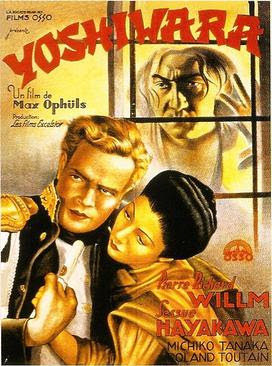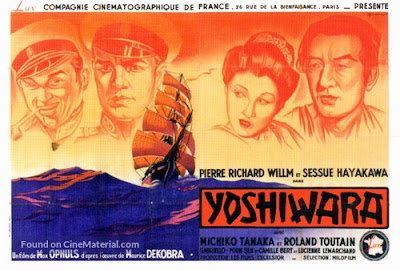Yoshiwara was the name of the Red Light District
in Edo beginning back in 1617 and lasting through fires and earthquakes until
the 1950's. It was an entertainment area for men to drink with Geishas and
frolic later on. House after house of women. At one point in the late 1800s
it was estimated that there were approximately 9,000 women working there.
Many Japanese films have been set there and portray the often tragic lives
of women in the Floating World. This though is not a Japanese film. It was
directed by the great Max Ophüls who has such classics as Lola Montes,
The Earrings of Madam de, La Ronde and Letter from an Unknown Woman to his
credit. After watching the film I read a bit about it and according to some
it is the worst film he ever made. And my first of his. Good going Brian.
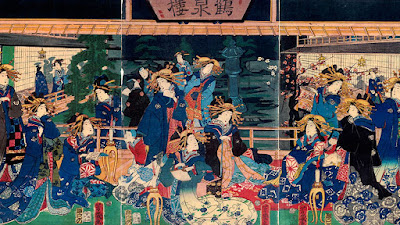
But I am always fascinated at how the West interprets the East. How Orientalized
is it. How much Yellow-Face will there be. Ophüls falls into the usual
trap of making a film that has too much of the Madame Butterfly syndrome
or more clinically termed the Pinkerton Syndrome about it. This is when a
white man is the savior of a Japanese woman in distress or servitude and
it inevitably ends in tragedy as if to say races don't mix. At the same time
Ophüls does a wonderful job of creating the Floating World - great detail
and design that clearly had some research behind it. Most of the Japanese
are Yellow-Face but he has two Japanese playing two of the three main roles
and they are quite famous in their way.
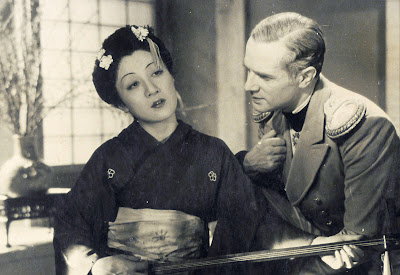
Sessue Hayakawa was born in Japan but after being turned down by the navy
he joined a theatrical troupe which toured America. There he was spotted
and offered a contract for films. And most amazingly he became a romantic
star in the silent era who had affairs with white women on screen. Considering
how most Asians were being treated in general and certainly in films this
was remarkable. He set up his own production company and made films that
were Asian based. Later he moved to France and made some films there before
returning to America and appearing in a few well-known films. No longer as
a romantic lead but usually as a Japanese villain - his most famous role
being the Commander in Bridge Over the River Kwai. The female lead in this
is Michiko Tanaka. In the 1930s she was a famous opera singer - doing Madame
Butterfly as well - and toured the world. She was actually offered the role
as the Chinese woman in The Good Earth but the Chinese were so upset that
it would go to a Japanese woman that the studio had to back down. And gave
it to a white woman of course.
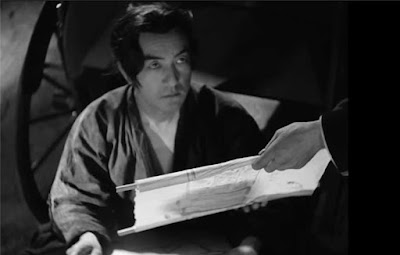
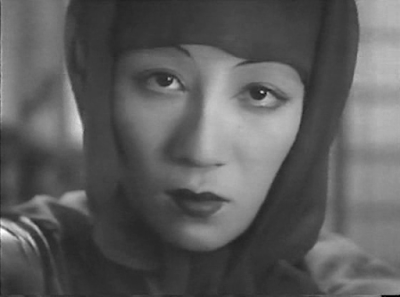
This takes place shortly after Japan was opened to the West. I am a
bit suspicious of the facts around this but will put that aside. A Russian
ship lands and the men make haste to Yoshiwara which welcomes them with open
arms and legs. Really? Highly unlikely as they thought of Gaijin as barbarians.
Kohana (Michiko) has just recently sold herself into a house to pay off the
debts of her family after her father died. Tonight is Lose Your Virginity
Night and one of the sailors gets rough with her until his commander breaks
it up. This is our White Knight. Lt. Serge (Pierre Richard-Willm). By the
way, both the Japanese and Russians speak in French. Apparently, Sessue's
French was not great so they had to simplify it for him.
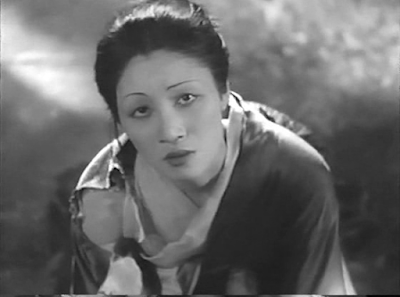
His role is as the coolie who pulls a rickshaw and is in love with Kohana.
Serge and Kohana quickly fall in love and make plans for the future and I
will leave it there. It is easy to see why the film is looked down on by
film scholars - the plot feels overdone and the mid section feels interminable
as the couple express their love for one another. But the beginning and ending
are quite good. And as I mentioned the sets are terrific and the cinematography
is great with some stunning close-ups of the stars. I guess if this is his
worst film one of these days I should watch his best.
